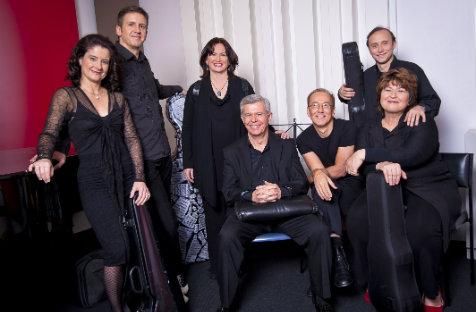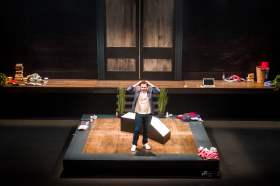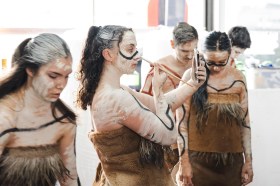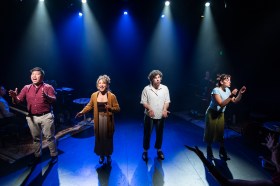Dene Olding, performing the same action that I’ve seen him do countless times (well, I could have counted each time he did it, so it’s not exactly ’countless’, but I never bothered to) took his glasses from his face, folded them up, and, holding his violin, his bow, and his glasses, faced the audience at the end of the concert. ‘Ladies and gentlemen,’ he said, ‘we’ve just made history here, I believe. This is now officially the longest concert we’ve ever done.’ I, my posterior having been ground to a fine pulp by the seats of the Clancy Auditorium of the University of New South Wales (how did I ever manage to sit through three-hour lectures here, I wondered afterwards) felt like shouting, ‘Thank you, Captain Obvious!’, but didn’t, mainly because it would’ve quite embarrassed me, and also as I like to think that I have pretensions towards being professional in my criticism. ‘Still,’ he said, ‘would you like one more?’ And one more we had – namely, Astor Piazzolla’s Oblivion – and after around two hours and forty minutes, the concert came to an end, leaving me fully satisfied. (Play me a good version of Oblivion and I’m yours.)
But, as I’m of the same opinion as George Bernard Shaw – who thought that a concert shouldn’t exceed two hours (which they usually don’t) – what, I wonder, could have been cut, have been summarily dismissed, from this unusually elongated program?
We began with Chanson et danses by Vincent d’Indy, a foray into wind (with a flute, oboe, two clarinets, horn, and two bassoons) that was one of the least impressive pieces of the night. You see, the problem with wind ensembles – and this is nothing to do with the music itself, mind you – is that the musicians just aren’t as dynamic as their string counterparts. There’s no back-and-forth along the semi-horizontal, as it were, that you’d get with a violin or cello. Not that I’m basing my opinion of the piece on this unfortunate stillness, mind you. It was pleasant enough, but never really grabbed the attention, nor, do I expect, did it have the subscribers raving during the interval.
The next piece, however, had quite a few audience members tittering away – much like they do during the ironies of a Shostakovich symphony – in that silent-yet-not smirk of approval towards a comedic element in a work. Ian Munro, pianist and composer extraordinaire, introduced the pieces that he had arranged for us: three works from Rossini’s Sins of Old Age, a ‘potpourri for flute, clarinet and piano’. Of the three (Petit caprice (style Offenbach), Prelude inoffensif from The Thatched-Cottage Album, and Un petit train de plaisir (A little holiday train) comico-imitatif from The Album for Wide-awake Children) it was the third that required Munro’s detailed synopsis and commentary. The story, as he told us (and as transformed through the prism of my less than stellar memory) was that the train leaves the station, the brakes are applied sometime later, society mingles at the station and boards, the train starts again then, after a bit, gets derailed, some people die, some go to heaven and some go to hell, a funeral march is held, a will is read to ‘grieving’ relatives, and the effects of the will on the relatives are explored. (This final part was the most humorous element, with the scene of the will being one of overt jubilation, like the man from Monopoly jumping up and down on his bags of money.) All of it was rather delightful – and rather silly.
The last piece before the shortened interval (only 15 minutes) was Verdi’s String Quartet in E minor. (The program tells us – as you might have guessed by now – that ‘a shared experience for the music of five of the eight composers represented … is that their music makes its appearance either in ways that do not conform to their wider reputation or to the original format in which they composed it.’) Here was something with a bit of that oomph that the piece for wind lacked, and it was warmly received by the enthusiastic crowd, and by myself.
After the interval came something that no one could have predicted (unless, of course, they’d been reading their programs and looked ahead): James Crabb and his accordion. Five pieces were to be played, with his ‘gallery of music for accordion, flute, clarinet, two violins, viola, cello and piano’. The last, Pizzolla’s Libertango (utterly charming piece that it was) was the only to include all these instruments, with the other four taking only a few members off the ‘bench’ each time. (The ‘bench’ was a row of seats at the back of the stage, where the retired musicians sat and listened to their colleagues, tapping the occasional foot to the beat, holding their sheet music in their hands, and so on.)
Torbjorn Iwan Lundquist’s Movements was the first piece, and was a rather difficult pleasure (if pleasure is what you call it) and probably could’ve been dropped by the wayside. Cesar Franck’s Prelude, Fugue, Variation Opus 18 was a revelation in its heartbreaking mood, and, along with the Libertango, was the highlight of the package.
Jukka Tiensuu’s Tango lunaire and Dvorak’s Bagatelles also made an appearance, but a little less of an impact. And then there was the Oblivion encore, with surely one of the weirdest ensembles to have played the piece, and we were released back into the world. Far too long as concerts go, but worth it nonetheless, for the most part.
Rating: 4 stars out of 5
Australia Ensemble – Subscription series Concert One
James Crabb (accordion), Geoffrey Collins (flute), Dean Newcomb (clarinet), Dene Olding (violin), Dimity Hall (violin), Irina Morozova (viola), Julian Smiles (cello), Ian Munro (piano), Sam Howie (clarinet), Robert Johnson (horn), Andrew Barnes (bassoon), Tony Liu (bassoon)
Vincent d’Indy – Chanson et danses Opus 50, for flute, oboe, two clarinets, horn and two bassoons (1898)
Gioachino Rossini – From Sins of Old Age (1857-1868): a potpourri for flute, clarinet and piano arr. Ian Munro (2012)
Giuseppe Verdi – String Quartet in E minor (1873)
Torbjorn Iwan Lundquist – Movements
Cesar Franck – Prelude, Fugue, Variation
Jukka Tiensuu – Tango lunaire
Antonin Dvorak – Bagatelles
Astor Piazzolla – Libertango
Clancy Auditorium, University of New South Wales
16 March





